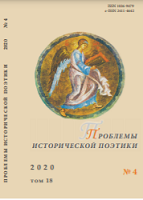Евангельский текст в творчестве Ф. М. Достоевского: проблемы и перспективы изучения
The Gospel Text in the Works of F. M. Dostoevsky: Issues and Study Prospects
Author(s): Valentina Vasilievna BorisovaSubject(s): Christian Theology and Religion, Studies of Literature, Russian Literature, 19th Century
Published by: Петрозаводский государственный университет
Keywords: Russian literature; The Gospel text; Dostoevsky; terminological thesaurus; ethnopoetics; aspects of learning;
Summary/Abstract: The article reflects on the results and prospects of studying the gospel text in the works of F. M. Dostoevsky at the present stage, identifies the main directions and methodological problems of their analysis and interpretation in the framework of ethnopoetics as a new scientific direction in literary studies of the late 20th - early 21th century. Its principles are rooted in historical poetics, which aimed to define the role and boundaries of the Christian tradition in Russian literature. As a result, the scientific discourse included new poetical categories of conciliarity (“sobornost”) and paschality, and the understanding of Christian realism as an artistic method was established. Its aesthetic principles were mastered by Russian literature in the 19th century. Revealed in the gospel, Christian realism appeared in Dostoevsky’s work as “realism in the highest sense.” The main result of studying Russian literature from the point of view of ethnopoetics is to identify the gospel text itself. It has not yet been singled out in the early 1990s, but today its key outlines are already well-described, above all - in the works of Dostoevsky. The regularities of the development of modern Russian studies of Dostoevsky in this regard can be traced using the example of the terminological thesaurus formed in the process of studying the gospel text in the works of the author of the Great Five Novels. There is a fundamentally significant combination of literary, philosophical, and theological categories. Nevertheless, the problem of distinguishing philological and religious-philosophical discourses in modern literary studies in general and in studies of Dostoevsky in particular remains relevant: on the one hand, a number of works remain inclined towards pure theology; on the other hand, scientists are paying increasingly greater attention to the analysis of the functions and ways of creative transformation of Christian tradition in Russian literature.
Journal: Проблемы исторической поэтики
- Issue Year: 18/2020
- Issue No: 4
- Page Range: 186-208
- Page Count: 23
- Language: Russian

